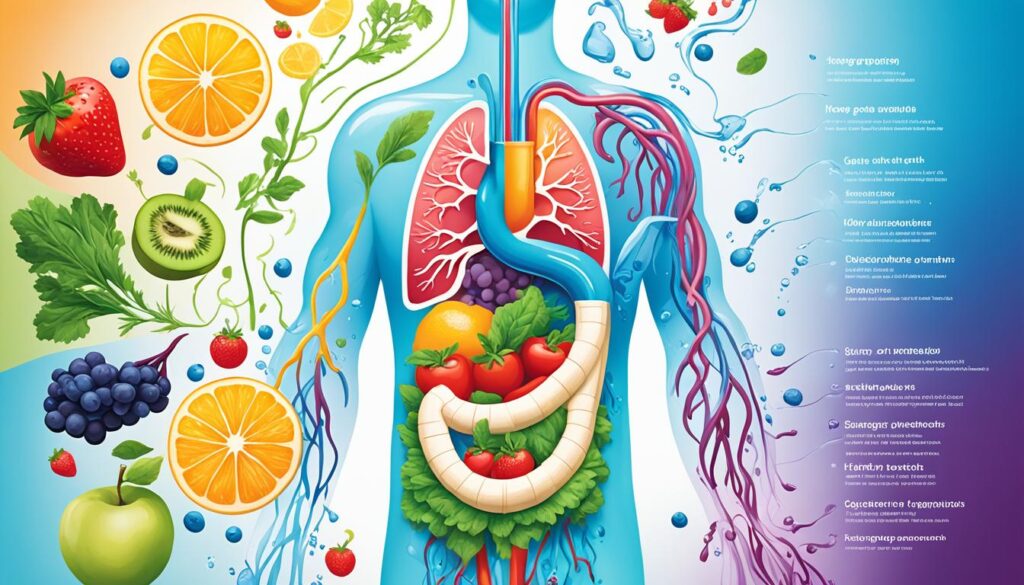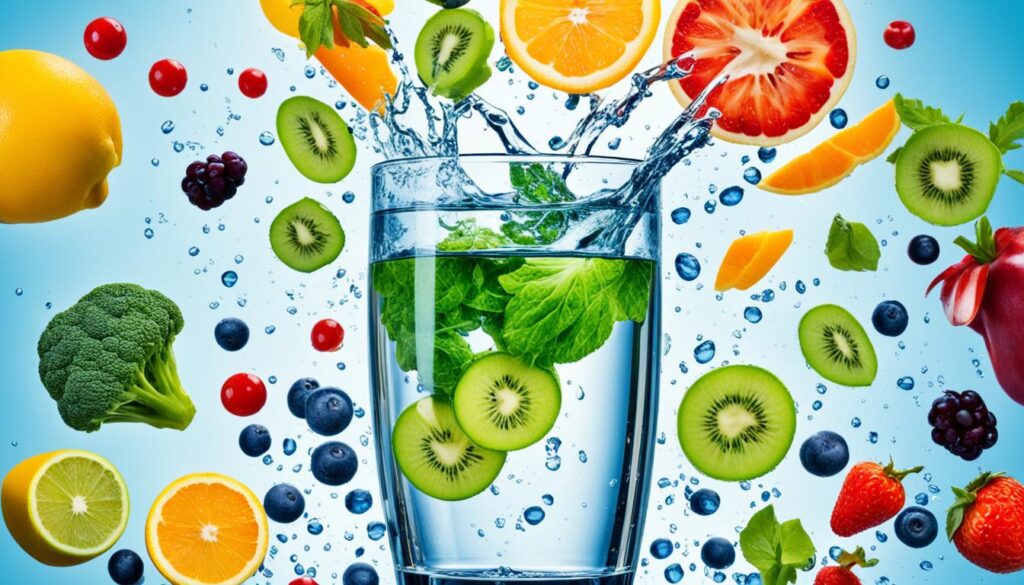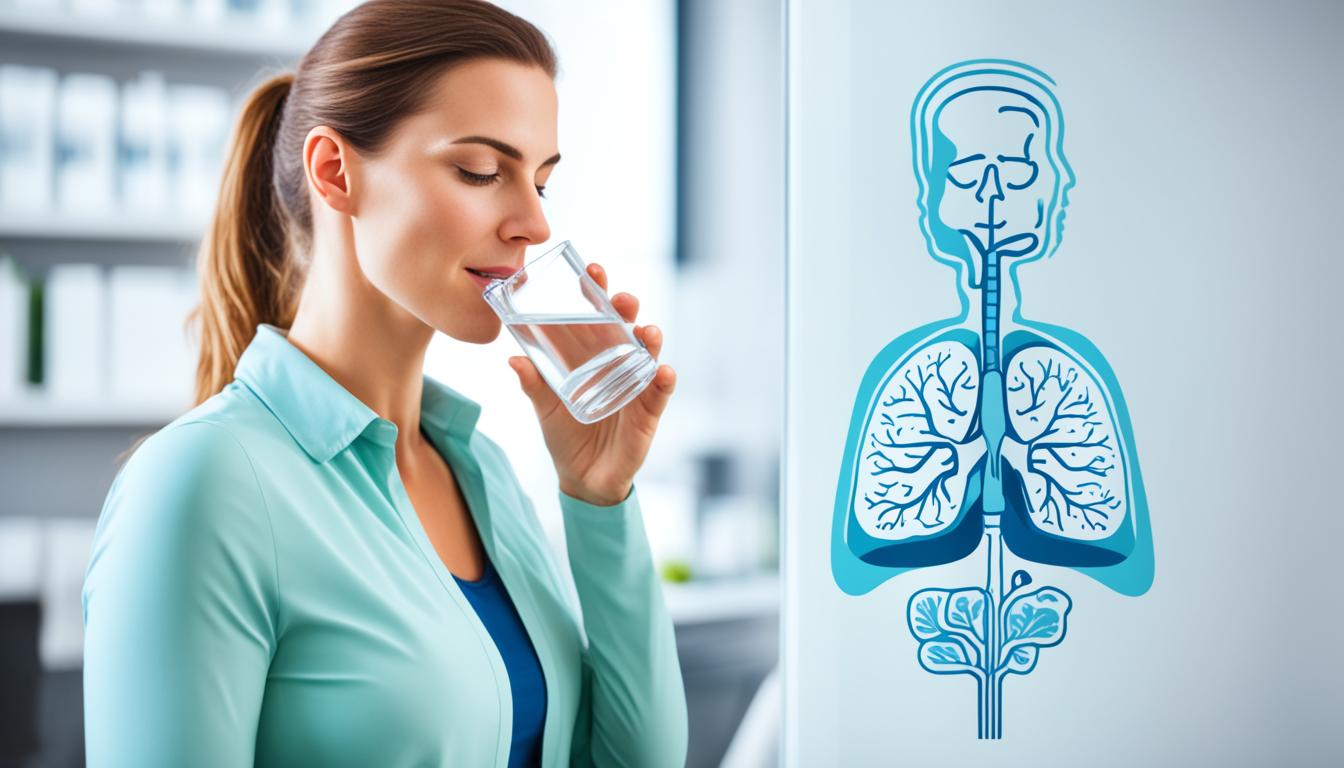Water is vital for the body’s functions, especially digestion. It helps maintain body temperature, lubricates joints, and aids in digestion through saliva. Water also breaks down food, helping absorb nutrients and making us feel full longer1.
Water removes waste via sweat, urination, and bowel movements, reducing the chance of constipation. This keeps our gut healthy1.
Staying hydrated enhances nutrient absorption and food use1. It’s key for digestion and gut health1. Men should drink 3.7 liters (15.5 cups) daily, while women need 2.7 liters (11.5 cups) to stay healthy as per the National Academy of Sciences1.
Proper hydration can slow aging, as a 2023 study found1. Just 1 percent more daily water can result in consuming fewer calories and less bad fat, sugar, salt, and cholesterol. This shows how vital water is for health, digestion, and gut health1.
The Basics of Hydration and Its Importance
Keeping our bodies hydrated is key to staying healthy. It affects many parts of our body, like our digestion and gut. Knowing how water influences these areas is vital for our well-being.
How Much Water Do You Need?
About half to sixty percent of our body is made up of water. Being properly hydrated is crucial for digesting nutrients well. For good health, men should aim to drink 5.5 cups (3.7 liters) of fluids daily. Women, on the other hand, need 11.5 cups (2.7 liters) daily.
Daily Water Intake Recommendations
Your daily water needs vary depending on how active you are, where you live, and your health. Eating water-rich foods helps meet some of your hydration needs while also giving you essential nutrients2. Be sure to limit drinks like coffee, tea, and alcohol. They can make you lose more fluid and might lead to dehydration2.
Signs of Proper Hydration
Knowing when you’re properly hydrated is crucial. Clear or light yellow urine suggests you’re well-hydrated. But, dark urine means you should drink more water2.
It’s also important to drink water before, during, and after you exercise. This helps your digestion and gut stay healthy. Always look out for these hydration signs to adjust your water intake as needed.
“In the United States and Germany, the hydration status was studied in 2005, revealing relevant data on water intake and its importance”3
How Water Aids in Digestion
Water is key for good health and digestion. It does more than just keep us hydrated. It’s essential for the digestive process, helps our bodies absorb nutrients, and works with digestive enzymes.
Water as a Component of Saliva
Saliva, or spit, is vital in breaking down food. It’s full of water. When we chew, saliva helps soften food and makes it easy to swallow.
Breaking Down Food for Nutrient Absorption
Water breaks down food so our bodies can soak up nutrients. Staying hydrated is critical. It helps us absorb the good stuff from what we eat and drink. About 20% of the water we need each day comes from food. The rest comes from drinks4.
The Role of Water in Digestive Enzymes
Water is crucial for our digestive enzymes to work well. These enzymes need water to do their job. It helps us digest food smoothly and absorb the nutrients our bodies need.
| Gender | Daily Water Intake | Percentage from Food |
|---|---|---|
| Men | 15.5 cups (125 ounces)4 | 20%4 |
| Women | 11.5 cups (91 ounces)4 | 20%4 |
Drinking enough water is vital for digestion. It supports the work of saliva and enzymes, helping our body absorb nutrients well. This is key for keeping our gut healthy and our body running smoothly.
Connection Between Water and Digestive Health
It’s really important to drink enough water for your digestive system to work well. About half to sixty percent of your body weight is water. This water helps move food through your digestive system smoothly2. Hydrating enough is key to keeping your digestion in top shape5.

Drink water to make saliva, which helps you chew and swallow food better5. This is a big part of breaking down food effectively. The more water you drink, the easier your body can move nutrients and get rid of waste2. Not drinking enough water can cause problems like constipation and a slow digestion2.
Some fruits and veggies have lots of water in them, like watermelon, cucumbers, and oranges. They also give you vitamins and minerals. Water, saliva, and stomach juices help break down food. So, water is super important for digestion5. Enzymes from different parts of your body that help digest food work better when you’re hydrated5.
If you don’t drink enough water, your body’s minerals might get out of balance. This can make your stomach feel full and slow down your digestion2. Drinking plenty of water helps your body process food well and get rid of waste easily. This lowers the chance of having stomach issues2.
In your large intestine, water helps dissolve fibers that your body can’t. This makes your stool softer and easier to pass5. Plus, this part of your body can absorb minerals better in a watery environment. So, water really does a lot for your gut and your health overall5.
Benefits of Hydration for Gut Health
Drinking enough water is key for good gut health. It helps the body work right and supports the digestive system. This keeps our stomachs healthy.
Preventing Constipation Through Proper Hydration
Hydration is great for stopping constipation. Enough water helps keep stools soft. This makes it easier for them to move through the body.2
Men should drink about 5.5 cups of liquid each day. For women, target 11.5 cups. This amount is good for your gut and helps avoid constipation2.
Foods with fibers, like oats and vegetables, help, too. They use water to become bigger. This makes digestion smoother. Without enough water, stools can be dry. This makes them hard to pass, leading to constipation2.

Role of Water in Preventing Gut Inflammation
Hydrating well also cuts back on gut inflammation. It keeps the intestines’ inner wall healthy. This stops gut inflammation from happening5.
Plenty of water helps juices and enzymes break food down. This makes digestion easy and lowers the chance of inflammation. Plus, the body absorbs more nutrients with enough water5.
A well-hydrated body runs digestion well. It fights off gut issues and keeps constipation away25.
The Impact of Water on Digestion and Gut Health
Studies show the vital link between water and our digestive system. Water is key for our gut to absorb nutrients well. It also keeps our digestive system moving smoothly and helps avoid stomach problems.
Examples From Research Studies
Water makes up over half of an adult’s weight, playing a big role in how our body works2. It helps the digestive system absorb nutrients better2. Without enough water, our body struggles to use nutrients right2. If you don’t drink a lot of water, you might get constipated. This shows how crucial staying hydrated is for our digestion2.
Expert Opinions
Health experts also say water is crucial for our digestive system. They state that drinking enough water keeps our body’s mineral balance right. Imbalances can slow down digestion, cause bloating, and make us feel uncomfortable2.
Hydration is also key to getting rid of waste properly, which keeps our gut healthy. It lowers the chances of getting sick because of digestive problems. Plus, keeping our water levels up helps control body temperature and moves important nutrients around2.
For a full view on water’s role in gut health, it’s important to meet the daily water goals. This can really benefit our digestive health in the long run. Using advice from the pros and what research shows can help us keep our guts healthy.
Effects of Dehydration on Gut Function
Dehydration can seriously affect your gut. It brings immediate and long-term health risks. It’s key to know the signs of dehydration and how to stop it for a healthy gut and body.
Symptoms and Signs of Dehydration
Feeling thirsty is the first sign you’re dehydrated. This happens when you’ve lost 1-2 percent of your body’s water6. If your urine is pale, you’re well-hydrated. Dark urine means you need more water2. You might also notice a dry mouth, feel tired, or get dizzy.
Long-Term Health Risks
Not drinking enough water over time can lead to serious health issues. It’s been linked to kidney stones, urinary infections, and high blood pressure. In older adults, not drinking enough water is a top reason for hospital trips6. To avoid these problems, make sure to stay well-hydrated.
Preventative Measures
Stopping dehydration is critical for a healthy gut. Adults should drink water all day long to stay hydrated and avoid dehydration signs6. Tips to stay hydrated include drinking lots of water, avoiding sugary drinks, and checking your urine color2. Men should aim for 3.7 liters of water a day, and women should drink 2.7 liters to prevent dehydration7. Also, it’s important to eat foods that have high water content7.
| Hydration Tips | Description |
|---|---|
| Monitor Urine Color | Pale yellow indicates proper hydration; dark urine indicates dehydration |
| Daily Fluid Intake Recommendations | 3.7 liters for men, 2.7 liters for women |
| Consume Water-Rich Foods | Fruits and vegetables can aid in maintaining hydration |
| Spread Water Consumption | Drink water throughout the day to maintain hydration |
| Avoid Dehydrating Beverages | Limit intake of alcohol, sugary sodas, and caffeine |
Water and Nutrient Absorption
Water plays a key part in helping our bodies absorb nutrients well. It does this by carrying vitamins, minerals, and other needed nutrients from our food. This makes it easier for our blood to take them where they are needed most2.
Our bodies are mostly made of water, showing its major importance for all functions and health2. Enough water makes sure we can use nutrients from our food well. Men should drink about 3.7 liters of fluids daily, and women need around 2.7 liters to absorb nutrients well2. With the right amount of water, the body can process food better. Then, it gets the vitamins and minerals it needs for good health.
Keeping hydrated is critical for good digestion. Water helps make digestive enzymes that break food down. This makes absorbing nutrients easier. Eating fruits and veggies high in water, like watermelon and cucumbers, keeps you hydrated. They also give important vitamins and minerals2. In the gut, water helps with absorbing nutrients, which is great for digestive health.
If you don’t drink enough water, you can get dehydrated. This can cause problems like dry stools and constipation. These issues really mess with digestion2. Drinking enough water helps prevent these problems. This means digestion works better, and your body can take in nutrients well. In the end, water is crucial for getting nutrients from food and for keeping our digestive systems running smoothly.
FAQ
How does water influence the digestive process?
What are the recommended daily water intake guidelines?
What are the benefits of hydration for gut health?
How can I tell if I am properly hydrated?
What are the effects of dehydration on gut function?
How does water help prevent constipation?
What is the importance of water in nutrient absorption?
How does water function as a component of saliva?
What are some research findings on water’s impact on digestion and gut health?
What are preventative measures to maintain hydration and avoid gut issues?
Source Links
- https://www.everydayhealth.com/water-health/water-body-health.aspx
- https://bgapc.com/hydration-and-digestion-gut-health/
- https://www.ncbi.nlm.nih.gov/pmc/articles/PMC2908954/
- https://www.healthline.com/health/food-nutrition/why-is-water-important
- https://www.herbalife.com/en-us/wellness-resources/articles/water-digestive-system
- https://digestivehealth.ws/avoid-dehydration/
- https://www.everydayhealth.com/digestive-health/gut-check-can-dehydration-affect-your-gut-microbiome/




